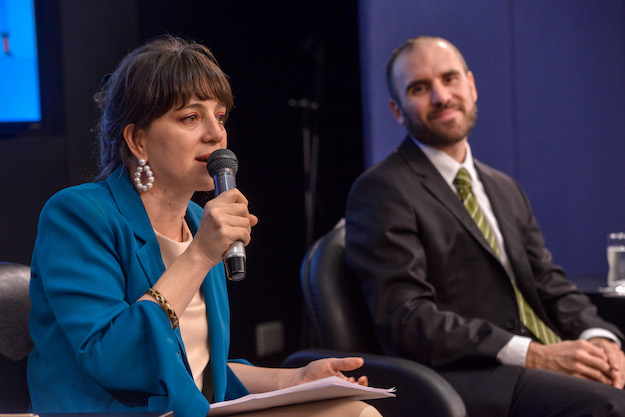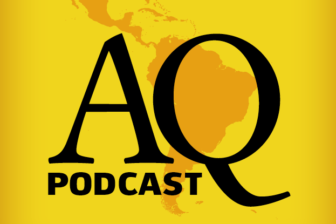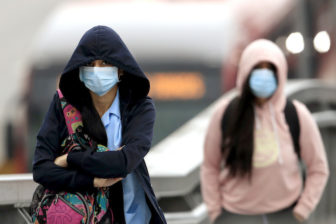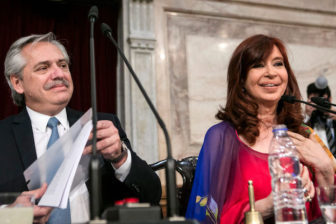BUENOS AIRES – By now, a significant chunk of Argentina’s population has been confined to their homes for two and a half months. But it would be a mistake to say the economy has shut down, according to Mercedes D’Alessandro.
“The economy is more alive than ever if you think about the care economy,” she told AQ, referring to sectors like nursing and education, as well as work done at home, such as cleaning and caring for children.
D’Alessandro is Argentina’s national director of economy, equality and gender, a newly created position within the economy ministry. For D’Alessandro, the pandemic is an opportunity to expand society’s conception of the economy: she notes that the lockdown has heightened the importance of work that is often minimized, underpaid (or unpaid) and carried out largely by women, including domestic work, childcare and education.
It’s by focusing on these spaces where D’Alessandro, 42, stands out from mainstream economists – and where she hopes to have the biggest impact. Since Economy Minister Martín Guzmán tapped her for the post in late 2019, D’Alessandro has been at the table for many of the ministry’s most important discussions, including recent discussions with the International Monetary Fund. But the pandemic has made her role more pertinent than ever, as the government seeks to soften the blow of a long quarantine that has worsened an economy already hurting from 40% poverty, 50% annual inflation and a scramble to avoid the country’s ninth sovereign debt default.
D’Alessandro wants to ensure Argentina’s response to the pandemic takes gender into account, she said. She points out that when Fernández announced a national coronavirus quarantine in March, the government began implementing an emergency cash transfer program targeting 8.7 million people. The focus of the program is informal workers, but domestic employees – the leading occupation for women in Argentina – have been included, even if they are formally employed.
In the medium- and long-term, however, addressing Argentina’s gender inequalities will be particularly challenging. As the country feels its way to a very gradual reopening, D’Alessandro is concerned about the pressures that will be placed on women – and single-parent households – as parents return to work before schools reopen. Half of the country’s workers have a minor at home, she said, and social customs and lower wages are likely to make women more likely to stay home, at an economic and social cost.
Further, social distancing has deprived many women of the community and family networks they rely on to both care for their families and work. D’Alessandro expects this will push many women further into poverty, and she is intent on responding with policy-driven solutions.
For years, D’Alessandro has focused on using data to illustrate economic gender gaps. In 2015, she co-founded Economia Femini(s)ta, an online media outlet and NGO dedicated to explaining issues facing women in the economy for average Argentines. From the economic impact of menstrual care products to advocacy for abortion rights, connecting these issues to policy is more important than ever, she said, and is vital to adequately addressing the new needs that COVID-19 has brought to the fore.
D’Alessandro’s presence in the economy ministry itself suggests a changing paradigm. Her personal style skews more edgy and cool than technocratic. When introduced as Guzmán’s pick for the post, she wore a black leather skirt and oversized pearl jewelry that contrasted with the staid suits favored by government officials. Of course, it’s impossible to compare her to predecessors, as her post is brand new.
“In the previous economic teams, there were no women on the front lines,” D’Alessandro told AQ. “It is very important that we are here, with a voice.”
Guzmán, who knew D’Alessandro when they both lived and worked in New York, hired her with the full knowledge that he was getting an assertive expert – not someone “who stays quiet on the sides, that takes notes and says yes,” she said.
D’Alessandro combines her unique style with a wonky grasp of data. Her best-selling book on feminist economics was subtitled: How to build an egalitarian society (without losing glamour). She also recently produced a study in the economy ministry to try to take stock of daily gender inequalities. The study found that women in Argentina carry out 76% of unpaid domestic labor and put in almost double the time on those tasks than the men who participate in household duties. One of the effects is a higher poverty rate for women and the families they head, as women are pushed into more precarious jobs and lower wages.
“The inequality of machista violence also has its base in economic inequality, in women’s lack of economic autonomy,” explained D’Alessandro. The push to legalize abortion also has an economic component, she said, as illegality has a higher mortality cost for poorer women.
To help shift the status quo, D’Alessandro enthusiastically supports gender quotas – though she prefers the term “equality guaranties” – in all decision-making spaces across society, from boardrooms to union leadership.
“A lot of problems would come to light and be resolved,” she said. “The fact of having women at the table thinking about these things changes the discussion.”
—
Timerman is a freelance reporter in Buenos Aires. She edits the Latin America Daily Briefing.







